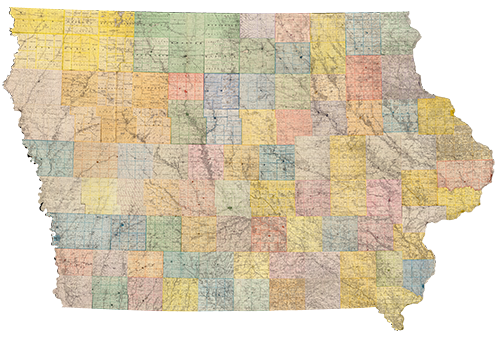The Emotional Toll of Extreme Weather and Hard Times
Havelock, Pocahontas county
When we read of homes and farms lost in floods or a life lost when someone drives into high water during a flash flood, we don’t have to pause very long to imagine not just the physical and financial but also the emotional price of this disaster. J.R. Overholt’s memoir about his father, Sigel George Overholt of Pocahontas County, is a candid, moving portrait of that emotional toll passed down from generation to generation.
George Goodchild, Sigel Overholt’s maternal grandfather, got the last homestead in Pocahontas County, 50 miles northwest of Fort Dodge. In the spring of 1869, he sent his oldest son, Edward, with two helpers and timber for a house, to the site he had bought. On the journey the young men were sleeping in the open and were subject to a cold spring storm that came up in the night from the northwest. Edward caught a chill that turned to pneumonia. Very shortly after, he died.
His father, age 51, had three remaining sons. The oldest, Henry, was just 11. As the family settled into the difficult work in difficult conditions, George pushed his wife and all his children hard, but especially his oldest son, the boy Henry.
J.R. Overholt describes in quick order all the difficult weather and other natural conditions that beset the family in the 1870s. “The introduction was fierce. Breaking the prairie sod was heavy toil. The work oxen were slow and stubborn. Learning when and what to plant was difficult, and the first crops were meager. One summer, grasshoppers ate up the crop. Another summer, the wheat crop became infected with rust. Chinch bugs chewed on the oats and barley. The pole barn collapsed during a blizzard killing 24 of 25 Goodchild dairy cattle.”
Matie L. Turner’s memoir of her mother corroborates these difficult conditions in Pocahontas County of the 1870s. She particular emphasizes the winter when the family was living in a “soddie” (a house made of sod) and the cattle were in a pole barn (four poles with a hay roof). From March 14-16 in 1870 a snowstorm was so blinding her father, fearing he would lose his way in the 75 feet between soddie and pole barn, tied a rope from the dugout to the cattle shed and proceeded along it hand over hand as he made his way back and forth caring for the animals. He managed to keep the path open even though the shed was buried in snow. “The cold was so severe that ice froze over the cattle’s noses and would have smothered them had he not [repeatedly] removed it.”
Although the Turner’s and the Goodchild’s were experiencing many of the same weather and other natural challenges, Turner’s father and Overholt’s great grandfather seem not to have shared other traits. J.R. Overholt candidly describes his great grandfather’s attitude and behavior and its effect on his family. “Through all his troubles, George Goodchild drove himself, his sons, his wife, and his daughter with a harshness stemming from disappointed hope and profound disillusion. He was an imperious taskmaster, and the family suffered—his sons in particular. Henry, who learned to be as harsh as his father, bore the brunt of it all. Naturally, he took it out on others who were smaller and weaker.”
Sixty years later, Ursula Goodchild Overholt, J.R.’s grandmother, told of an incident from her sixteenth year that seemed to have shaped her life. One evening while she was doing dishes, her brother Henry grabbed her mother’s sewing scissors and cut the braid that hung down her back. Slapping her in the face with the braid he announced, “’Now the boys won’t be making sheeps eyes at you, Sulie!’” Even sixty years later, Ursula’s grandson writes, she could not tell the story without breaking into uncontrollable sobs—“the only time anyone ever saw her armor pierced.”
In 1879 at age 17 Ursula escaped to the town of Havelock, three miles away, to gain a teaching certificate and a job. When opportunity arose again, she traveled 18 miles from home to get typesetting experience and a job in Humboldt County. But then her mother fell ill and she was called back home. Two years later, she escaped again by marrying Joseph Owen Overholt, the writer’s grandfather.
Describing his grandmother, J.R. observes, “With such a father and such a brother, Ursula learned that the only safety in life was to cow others before they could cow you. A woman, she learned, could intimidate others with incessant talk, talk that never stopped for breath or for the feelings of others.” He believed that she practiced this form of intimidation on his grandfather.
Source: SHSI: J.R. Overholt, “Sigel George Overholt: A Memoir,” 1996; Matie L. Turner, “Dedicated to the Memory of My Mother: 1845-1929,” 1940; on-line: image: Padaig O’Morain, “We Need to Tackle Women’s Death by Despair,” Irish Times, June 14, 2018.
